How To Sell Online Courses: Proven Blueprint
 Platform Review
Platform Review

Discover expert insights and actionable strategies in our comprehensive guide on selling online courses.
Are you ready to start selling your courses online? If yes, this detailed guide will show you how.
And, if you haven't made your course yet, take a look at our complete guide on How To Create an Online Course: 10 Steps (Proven Blueprint).
Did you know that creating online courses is just the tip of the iceberg? Almost anyone can do it, but here's the catch – selling them is an entirely different ball game, which is why some courses succeed and others fail.
And, understanding how to sell your courses once they're ready. That's a whole different story. 😉
I've been in the online course game since 2016, and let me tell you, the journey has been eye-opening.
With over 1.6 million dollars in revenue, I've learned the hard way that mastering course creation is just the beginning. Selling? That's where the real magic happens.
It took me years and many failed experiments to figure out how to sell online courses, and the key thing to understand is that you can't just record a course and then figure out the sales part later. That doesn't work.
Believe it or not, the sales process starts even before you have recorded a single video.
So, how do you create and sell online courses successfully?
To sell your online course successfully, follow these 10 steps:
- Pick a course niche that sells
- Research and plan your online course
- Pre-sell your online course
- Create your course content
- Choose your course hosting platform
- Pick your course price and choose a pricing model
- Brand your online school
- Create a high-converting sales page
- Setup your course marketing tools
- Promote and sell your online courses using media buying, social media, email marketing, webinars, podcasting, affiliate marketing, and SEO.
This post will go over all the above steps for selling courses that I have learned and refined over the years, and I'm sure they will work for you too. 😉
So without further ado, let's dive right in.
You can also check out all the free guides available at the Course Creator Academy by clicking on the Academy link on the top menu.
Step 1: Pick a Course Niche that Sells
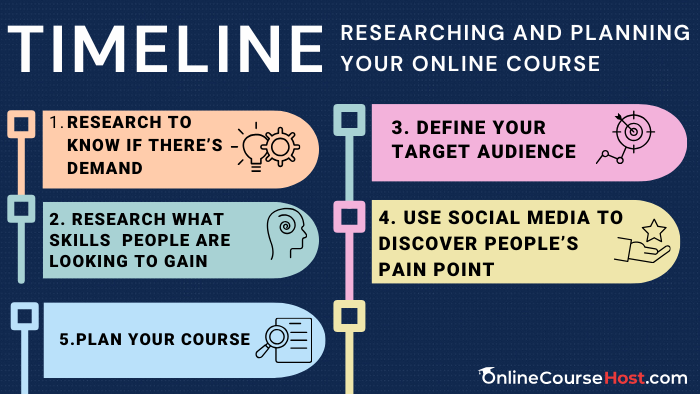
To successfully sell online courses, you need to choose a niche that people are actively looking for and buying.
One easy way is to leverage free marketplace data. Don't rely on gut feeling only.
Udemy for example, is the biggest online course marketplace, with over 49 million students. You can use their free analytics to pick a good topic.
Create an instructor account on Udemy to use its Marketplace insights tool, and search for a few topics.
Once you’ve identified a niche, dig into the specific topics within that niche that people are searching for and buying courses on.
You can also use tools like Google Trends, Google’s Keyword Planner, and Udemy’s course catalog to explore trending topics and phrases. Look for rising search volume and high student enrollment in related courses.
Within your chosen niche, focus on a specific course topic you have expertise in. Instructors with deep knowledge and experience teach the most successful courses.
Also, think about your professional background, education, skills, and hobbies—what could you teach that people would pay to learn?
When you find an intersection between your expertise and a popular course topic, you’ve found your gold mine.
This combination of a course niche and topic with high demand and your ability to create amazing content on it is the perfect recipe for success in selling online courses, and with a little promotion, students will be lining up to enroll in your program.
Remember, the key factors for choosing a profitable course niche are:
- Active demand - Look for rising search volume and popular course topics.
- Your expertise - Focus on a subject you have in-depth knowledge of.
- Evergreen appeal - Pick a topic with long-term relevance that won’t quickly go out of style.
- Competitiveness - Aim for a niche with some competition, but not one that is completely saturated. You want a chance to stand out!
By evaluating various niches and finding the ideal match for your skills and interests, you’ll be well on your way to building a successful online course business, so choose wisely.
I have 2 in-depth topics on how to research to determine if there’s market demand for your courses that you should read:
- How To Choose An Online Course Topic (That Sells)
- How To Tell If Your Online Course Idea Will Sell or Not
Step 2: Research and Plan Your Online Course
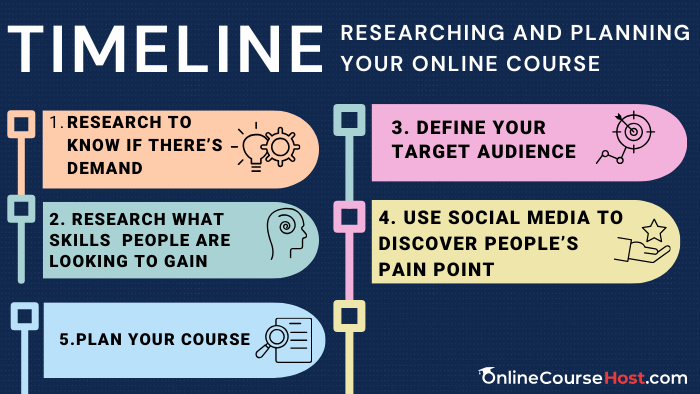
Before creating your online course, do some research to determine if there’s demand and who you'll be selling your courses to.
Think about what skills or knowledge people are looking to gain. Are there any gaps in the current course offerings?
Conduct surveys, analyze search trends, and see what people are talking about on social media and online forums. This will help validate your course idea and guide how you develop the content.
Once you’ve identified an interested audience, start planning your course. Determine the main objectives and outcomes, then structure the content into modules and lessons.
For instance, if you're teaching photography, you could include modules covering camera fundamentals, lighting techniques, composition, and photo editing. Within each module, organize around 5-10 concise lessons, ensuring that each video remains under 10 minutes.
Then go ahead and outline each lesson to stay organized. Include an engaging title, learning objectives, an opening summary, content examples, interactive elements like quizzes or worksheets, and a closing summary.
Also, come up with thought-provoking questions and activities to reinforce key concepts.
Step 3: Pre-sell Your Online Course
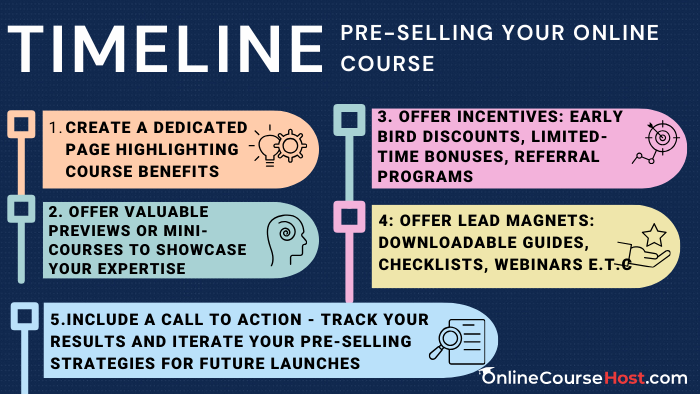
To generate excitement and attract students ahead of your course launch, start pre-selling it. Pre-sales involves marketing your course and offering discounted access before the official start date.
Start by creating a dedicated webpage for your course, detailing its content and the learning outcomes for students, and make sure to include a sign-up form for the pre-sale as well.
You should also provide an incentive, such as a discount or early access, and promote your course page through social media, your website, and email campaigns.
Leverage newsletters and social media too to generate excitement about your course, and share updates, discuss the topics covered, and offer special discounts to your followers.
Don't forget to engage with comments to maintain and amplify the buzz..
You can also create urgency by offering big discounts for a short time during the pre-sale. For example, say "Pre-sale ends Friday at midnight! Get 50% off now."
Then, reduce the discount as the launch date nears to encourage early sign-ups.
Another idea is to give away valuable stuff upfront, like a free email course or webinars, to build trust, and be honest about what the paid course offers.
Once the course starts, make sure it exceeds expectations, because satisfied students will become advocates, spreading the word and attracting more participants.
By mastering pre-sales and launching successfully, you'll not only make your course profitable but also build a base of happy students, crucial for selling your online courses.
Next, I'll explain how to create an engaging online course that will sell.
Read How To Pre-Sell Your Online Course (3 Effective Options) for more ideas.
Step 4: Create Your Course Content
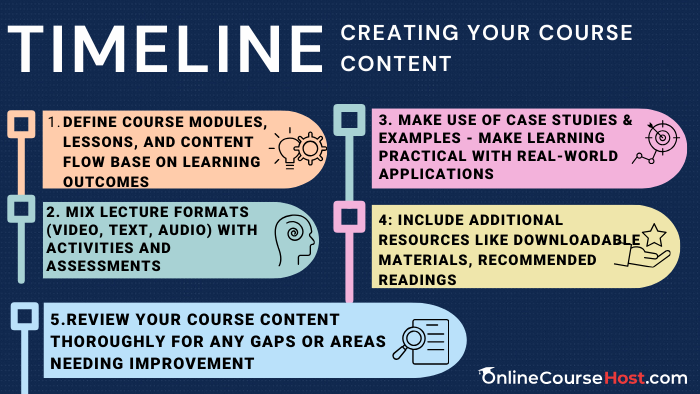
The key to a successful online course lies in the quality of its content. So, focus on teaching a specific skill or topic in a clear, step-by-step manner.
Begin by selecting a topic that you are knowledgeable about and passionate about. Ensure there is demand for content on this topic by conducting research.
You'll have to outline your content by breaking it down into logical sections such as introduction, basics, tools, advanced techniques, and tips. Expand each section with specific lessons, activities, and resources.
Create engaging video content that follows your outline, keeping videos short and energetic to maintain student interest. Then supplement your videos with additional resources like downloadable materials, recommended readings, and community forums.
Also, make sure to review your course content thoroughly for any gaps or areas needing improvement. Seek feedback from peers or conduct beta tests with a small group of students to refine your course before launch.
Your online course can surpass expectations and make students happy by offering valuable content, fun activities, and helpful resources. This in turn leads to satisfaction and good reviews from students.
Step 5: Choose Your Course Hosting Platform
When selling online courses, one of the most important decisions you'll make is which platform to host your course on.
The platform you choose depends on your needs, skills, and budget. Think about how simple or customizable you want the experience to be for you and your students.
Compare the features and pricing of different options. And don’t be afraid to switch platforms if you start with one solution but find it’s not the right fit.
The most important thing is finding a platform that will help you achieve your goal of creating and selling a successful online course.
I recommend OnlineCourseHost.com for creating and selling online courses. It’s very easy to use and set up, with no technical skills required. You have flexibility in course design and can embed videos, PDFs, and more.
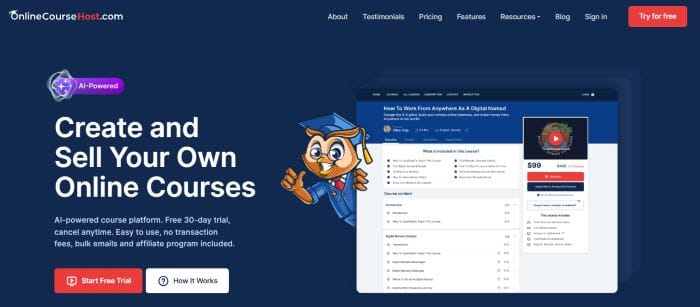
It's integrated with marketing tools and integrations with other apps. OnlineCourseHost.com is a great option if you want more customization and access to powerful features to help sell your online course.
For more explanation on choosing your online course hosting platform, read the following guides:
How To Choose an Online Course Platform (Complete Guide)
Where Should You Publish Your Online Course? (Self-Hosting vs Marketplaces)
Next, I'll show you how to price your online course to maximize profit.
Step 6: Pick Your Course Price and Choose a Pricing Model
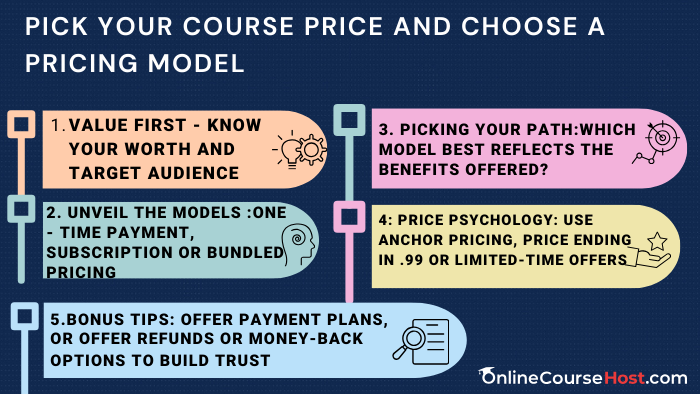
When it comes to selling your online course, the price you choose is critical.
Set it too high, and you risk losing sales; set it too low, and you might not earn what you could. Finding the right price requires some trial and error.
So, consider these factors when setting your price:
Your audience: Hobbyists may prefer lower prices, while professionals might be willing to pay more.
Course length and value: A multi-week course with lots of content and access to you can command a higher price than a short video series.
Your expertise: As an established expert, you can charge premium rates. As a newcomer, aim for the lower end of the range.
Competitor prices: Look at similar courses to gauge a competitive price range.
Now, let's take a look at some pricing models that may suit your course and goals:
- One-time payment: Offers lifetime access but limits revenue potential.
- Subscription: Provides recurring revenue but more people might stop using them over time.
- Hybrid: Combines upfront payment with the option for a subscription.
- Bundles: Discounts for buying multiple courses together.
- Payment plans: Break the cost into smaller, manageable payments.
The key is to get started and refine your approach over time. Choose a pricing model that aligns with your objectives, and you'll be on your way to selling your online course effectively.
For more details on how to price your online course before selling, check out this in-depth guide:
How To Price an Online Course (7 Science-Based Tips)
Step 7: Brand Your Online School
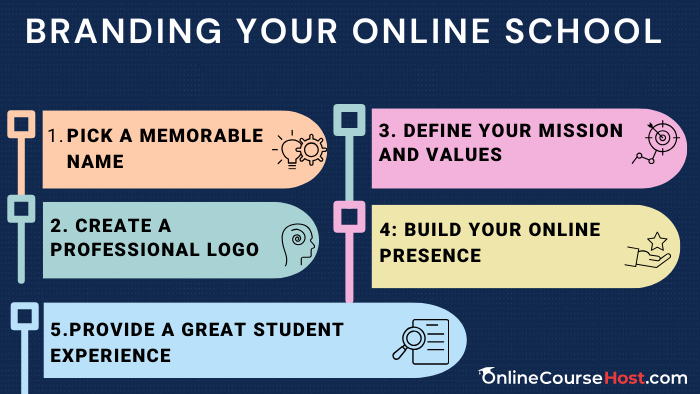
To build a successful online course, you need to establish a strong brand.
Your brand is what makes you unique and gives students a sense of what they can expect from your school. It's how people will recognize and remember you.
Some key steps to branding your online school:
- Pick a memorable name: Choose a simple yet distinctive name for your school that reflects your niche or area of expertise. Something like “Learn Coding Now” or “The Copywriting Academy.” Keep it short, sweet, and to the point.
- Create a professional logo: Create a standout logo for your brand. Ensure it's visually appealing but not overwhelming. You can hire a designer or use a logo maker tool. Your logo will feature on your website, course materials, and social media profiles.
- Define your mission and values: Decide on your school's mission and values. For instance, your mission could be "Offering practical, affordable education for career advancement." Values like excellence, transparency, and student success are important. So, make sure to share your mission and values on your website and in course promotions.
- Build your online presence: Get online to make more prospective students know about you and to get students. Make accounts on Social Media platforms, and share tips on blogs, podcasts, or YouTube. Keep your followers interested by posting regularly and talking with them.
- Provide a great student experience: Make sure students have a great time. It's a big part of your brand. Keep things easy for them from the start to the end. Talk clearly, give them valuable content, make the course simple to follow, and be helpful when they need it. Be available to every student, so they know they can trust you.
Following these key steps will help you build a memorable brand and successful online school. Be consistent and authentic, focus on serving your students well, and your brand will grow through word-of-mouth and customer loyalty.
For more details on branding, you can check out these in-depth guides that I wrote:
- Create a Powerful Brand for Your Online Courses (In 5 Steps)
- How To Create a Personal Brand For Your Online Courses (Ultimate Guide)
Step 8: Create a High-Converting Sales Page
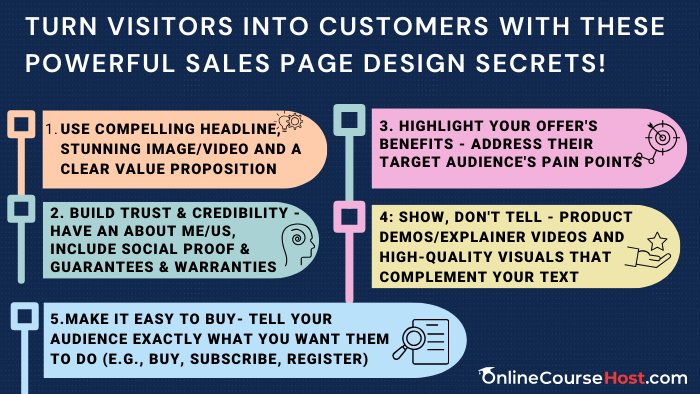
To sell your online course, you need a compelling sales page that persuades visitors to buy.
To make a sales page that gets people to sign up for your online course, follow these steps:
- Know Your Audience: Understand who you're selling to. Think about their needs, problems, and desires.
- Highlight Benefits: Show people what they'll get out of your course. Explain how it will help them solve their problems or achieve their goals.
- Use Compelling Headlines: Grab attention with a headline that speaks directly to your audience and promises a solution to their problem.
- Clear and Concise Copy: Keep your writing simple and easy to understand. Avoid jargon and focus on communicating the benefits of your course.
- Visual Appeal: Use images and graphics to break up the text and make your page visually appealing. Show screenshots or examples of what students will learn.
- Share your story: Tell visitors why you created the course and how your own experience will allow you to guide them. Let your passion shine through! People buy from those they know, like, and trust.
- Outline the curriculum: Provide an overview of the key modules, lessons, and topics the course will cover. Also, making use of visuals like images, diagrams, or a course timeline can help demonstrate the scope and sequence.
- Social Proof: Include testimonials or reviews from satisfied students to build trust and credibility.
- Call to Action: Clearly tell people what you want them to do next. Use a strong call-to-action button that stands out on the page.
- Offer Guarantees: Reduce the risk for potential buyers by offering a money-back guarantee or free trial.
- Use scarcity: Note that the course price will increase or enrollment will close soon to encourage visitors to buy now before it’s too late. Scarcity taps into the fear of missing out.
- Make it easy to buy: Have a prominent call-to-action button like “Enroll Now” or “Buy Now” that links directly to your checkout page. The fewer obstacles to purchasing, the more sales you’ll get.
- Mobile-Friendly Design: Make sure your sales page looks good and works well on mobile devices, as many people will be browsing on their phones.
- Test and Optimize: Continuously test different elements of your sales page, such as headlines, images, and calls to action, to see what works best and improve your conversion rate over time.
By following these steps, you can create a high-converting sales page that effectively sells your online course to your target audience.
Step 9: Setup Your Course Marketing Tools
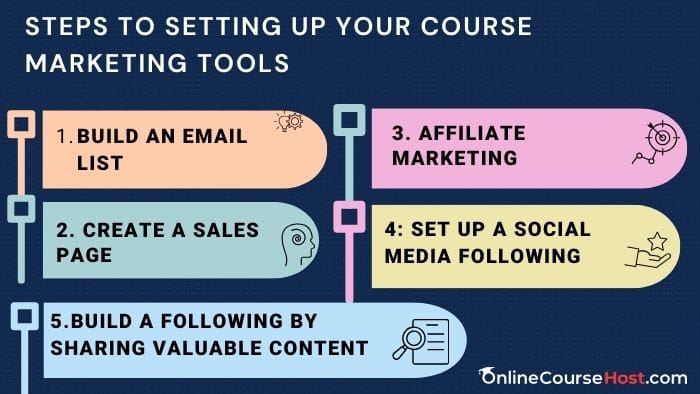
To successfully sell your online course, you’ll need to set up some essential marketing tools. These tools will help you spread the word about your course launch, attract potential students, and make sales.
Build an email list. An email list is one of the most powerful ways to market your course. I advise you to start building your list early by offering a lead magnet like a free resource on your website in exchange for people’s emails.
You can then email your list with updates about your course launch and special offers.
Create a sales page. Your sales page is where people will go to learn more about your course and ultimately make a purchase.
Include details about what’s covered in the course, the benefits students will gain, and add social proof like testimonials. You may share some of your own experiences and qualifications to build credibility. Offer a discount for early students to create urgency.
Affiliate marketing is another tool you should consider setting up, because it is a great way to leverage other people’s audiences to promote your course.
Find influencers and bloggers in your niche and offer to pay them a commission for any students they refer. Make sure to provide them with marketing materials to share with their followers.
You should also set up a social media following. Platforms like Facebook, Instagram, and LinkedIn are perfect for promoting your online course.
Share valuable content and engage with your target audience to start building a following. Then you can promote your course launch and special offers to your social media fans.
You can also look for opportunities to partner with other influencers for social media collaborations, and cross-promotion.
With the right marketing tools and strategy in place, you'll be well on your way to launching and selling a successful online course.
Step 10: Promote and Sell Your Online Courses
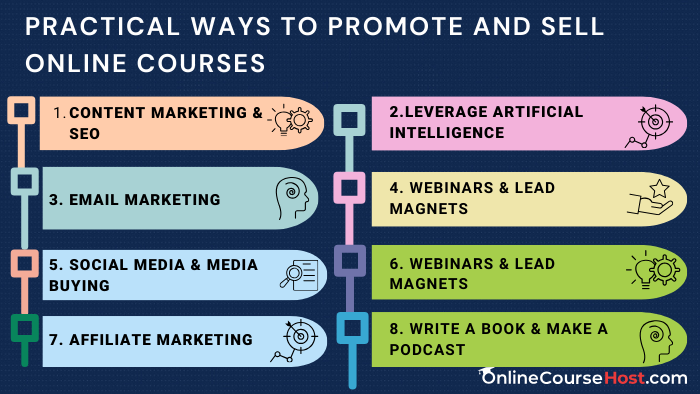
Promote and sell your online courses using media buying, social media, email marketing, webinars, podcasting, affiliate marketing, and SEO.
Once you’ve created your online course, it’s time to spread the word and start selling it. Here are some of the top ways your course and drive sales:
Here are 12 proven and practical ways to promote and sell online courses
1: Content marketing: A great way to connect with your audience and sell your online courses. You can do this by writing blog posts on your blog, guest posting by writing for other websites that have readers interested in your topic, making videos, sending emails, or posting on social media.
Ensure you write posts that solve your audience's problems and share your personal stories. Use keywords that people might search for and tell your readers about your courses.
When you consistently put out helpful content, it well will help you sell more of your online courses.
2: Email Marketing: Email marketing is a potent tool for selling online courses, offering a high return on investment. Two main strategies are email drip campaigns and newsletters.
Drip campaigns send a series of emails over time, guiding your subscribers to purchase your courses. To set one up, define goals, understand your audience, and plan your schedule, crafting valuable emails showcasing course benefits.
Newsletters are effective too, with many subscribers. Segment your audience, use catchy subject lines, and include student testimonials, and by employing these strategies, you can boost course sales.
OnlineCourseHost integrates with email systems, making it easy to set up email drip campaigns and email newsletters.
3: SEO (Search Engine Optimization): SEO, or Search Engine Optimization, is crucial for making your website more visible on search engines like Google.
By using the right keywords and optimizing your content, descriptions, and URLs, you can attract more potential students to your online courses. It's important to have a mobile-friendly website and gain backlinks from other sites to boost credibility.
Remember, SEO requires ongoing effort, but with patience and consistency, you can improve your rankings and attract more students.
4: Social Media Engagement: Social media engagement is a powerful tool for promoting and selling online courses. Make sure you choose the right platform for your audience, create engaging profiles, and use short videos to showcase your courses.
You can also collaborate with online communities to expand your reach. By leveraging these strategies, you can effectively market and sell your online courses through social media.
5: Affiliate marketing: Affiliate marketing offers a cost-effective approach to selling online courses, where affiliates earn commissions for referrals resulting in your online course sales.
To succeed, ensure your courses are high-quality and set up an affiliate program on platforms like ShareAsale or Commission Junction. OnlineCourseHost.com has an in-built affiliate program dashboard where you can this up.
Define attractive commission structures and provide marketing resources to affiliates. Also, use analytics tools to track performance and optimize strategies. Building strong relationships with affiliates is key to success.
6: Leverage Artificial Intelligence: Artificial intelligence offers great opportunities for selling online courses. By using AI strategies, you can boost your sales significantly.
One strategy is Personalized Learning Paths, where AI analyzes students' learning styles and creates customized paths based on their strengths and weaknesses.
You can also use AI-powered chatbots to offer instant and personalized customer support to students.
Overall, AI offers various ways to improve online course sales and engagement.
7: Lead Magnets: Lead magnets help to sell online courses. They offer valuable content, like beginner guides, to attract potential students.
To understand your audience, you can ask them questions with surveys to learn what they need and like, and use email marketing, to collect leads and group them based on what they like.
Giving special offers, like discounts or sneak peeks of courses, can persuade people who download lead magnets.
Additionally, retargeting ads help keep offers visible on platforms like Facebook and Google. Overall, lead magnets can significantly boost engagement and drive sales for online courses when implemented effectively.
I advise you to read the following posts to set up leads for your online course sales successfully
- How To Generate Leads For Your Online Course Business (8 Proven Strategies)
- What Is The Best Lead Magnet For Your Online Courses?
8: Webinars: To effectively promote and sell your courses through webinars, create a dedicated landing page.
You can also share success stories from past students, offer time-limited discounts, conduct Q&A sessions, and regularly analyze performance metrics for adjustments.
9: Write a book: Writing a book can boost your credibility in your industry, helping you promote and sell online courses. By cross-promoting your book and courses, you can increase exposure and conversions.
You can also use your book as a lead magnet for email marketing, and gather feedback from readers to improve course content. Overall, writing a book sets a strong foundation for effective marketing strategies to drive engagement and sales of your online courses.
10: Make a podcast: Podcasting is a potent tool for marketing your online courses. It allows you to connect with potential students, address their needs, and position your courses as solutions.
By hosting industry-related discussions, you establish authority, encouraging students to trust your expertise. Podcasts serve as a sales funnel, providing insights from your courses and directing listeners to enroll.
Read my post on How to Launch a Podcast To Skyrocket Your Online Course Sales to learn more on how to use podcasting to sell your courses.
11: YouTube: YouTube is a powerful platform for promoting and selling online courses, boasting billions of monthly users and hours of content watched daily. Here's how to use it effectively
- Create a dedicated channel for your course niche to provide regular updates.
- Ensure your videos match your course topics for effective cross-promotion.
- Use attractive titles and thumbnails to attract viewers.
- Utilize YouTube's features to engage with your audience and promote courses.
- Consider running ads to showcase course benefits and testimonials.
Using YouTube wisely can significantly boost course visibility and enrollment rates.
12: Media buying: Media buying is the practice of purchasing advertising space on digital platforms such as social media and search engines. When used strategically, it can be highly effective for promoting and selling online courses.
The process involves defining your target audience, setting campaign goals, choosing relevant platforms and ad campaigns, implementing A/B testing, utilizing analytics tools to track performance, and incorporating retargeting strategies to re-engage potential students.
By carefully planning and optimizing media buying efforts, online course creators can increase visibility and drive enrollments effectively.
Conclusion
So there you have it! A step-by-step guide on how to sell online courses. From coming up with a course niche that sells to launching your course and marketing it to potential students, I've covered all the key steps to get you started.
Although there are many things to look out for, it all comes down to three fundamental things:
- Finding a course niche that sells
- A course hosting platform rich in marketing features
- Your commitment to promoting your courses consistently
If you get these right, you will be able to build a successful online course business.
The process does take time and effort, but with passion, drive, and a willingness to learn as you go, you'll be teaching your students before you know it.
And, as you start creating your online course, be flexible and make sure to keep up with new trends and technologies for ongoing success.
As aforementioned, after creating your course, you'll still need a reliable hosting platform with marketing features to make selling your courses easy.
That's where OnlineCourseHost.com comes in. With Onlinecoursehost.com, you have everything you need to create and sell your online course.
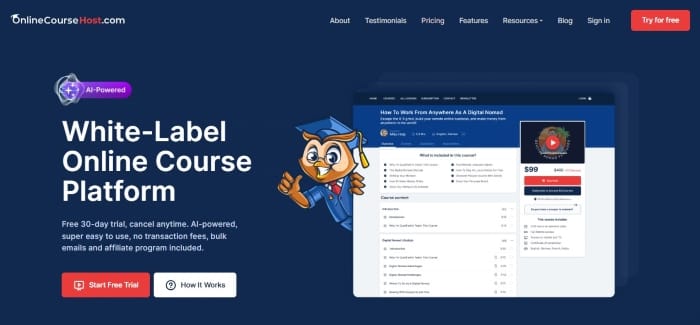
The platform is integrated with an AI assistant and comes with powerful marketing features like email marketing and Facebook Ad integration.
You can also collect emails on autopilot directly on your course website and send bulk newsletters to your students.
Overall, the platform is user-friendly both to course creators and students.
I hope you find this post helpful, and to get notified when new content is available here at the Academy, you can subscribe here to our weekly newsletter:
If you are looking to ask any questions on online course creation, you can reach me here on my Facebook group:
Join the Course Creator Academy Facebook Group
Ready to learn how to launch your first coaching program or course on OnlineCourseHost.com? Here are the helpful guides for you to check out:
- Best Online Course Platforms (Ultimate Guide)
- How To Choose An Online Course Topic That Sells
- How To Record And Edit Your First Online Course
- Affordable Online Course Equipment - Complete Practical Guide
- How To Hire An Online Course Team
- The Ultimate Online Course Launch Checklist
- How To Create The Perfect Online Course Sales Page
- Create A Powerful Brand For Your Online Courses (In 5 Steps)
- How To Sell Online Courses? The Ultimate Guide
- How To Promote Your Online Course - Complete Guide
Let me know in the comments below what other topics you would like me to cover or any questions that you have.
Thanks for reading… and enjoy the course creation process! 😉
Course Creators Academy, a community by OnlineCourseHost.com
Founded by Vasco Cavalheiro
Online Course Creator








 Start Here
Start Here Course Creation Journey Step by Step
Course Creation Journey Step by Step  Course Creation Software Reviews
Course Creation Software Reviews Online Course Marketing
Online Course Marketing Course Creation Tips & Tricks
Course Creation Tips & Tricks Course Equipment
Course Equipment Online Course Marketplaces
Online Course Marketplaces Revenue Reports
Revenue Reports Best Practices
Best Practices Frequently Asked Questions
Frequently Asked Questions Platform Reviews
Platform Reviews